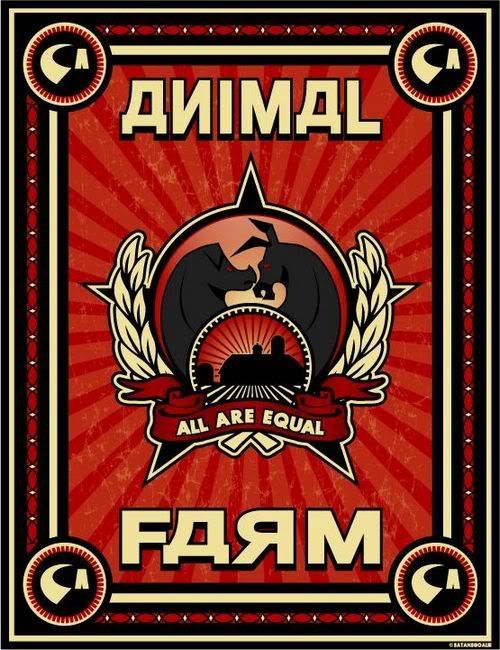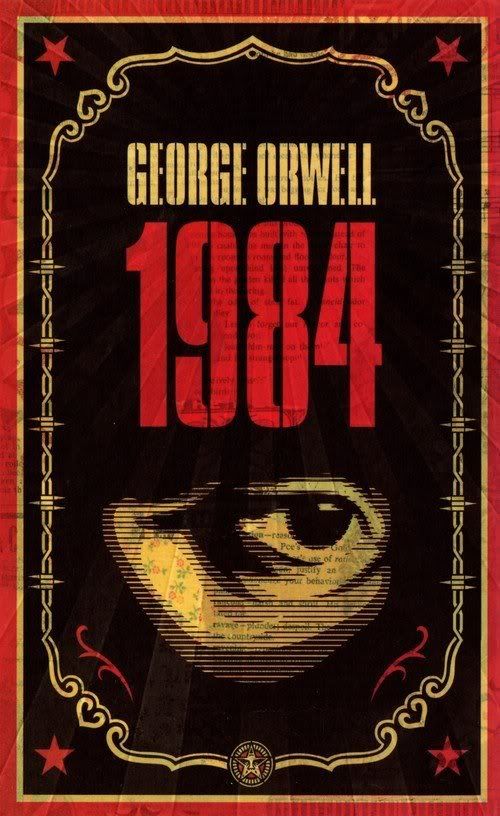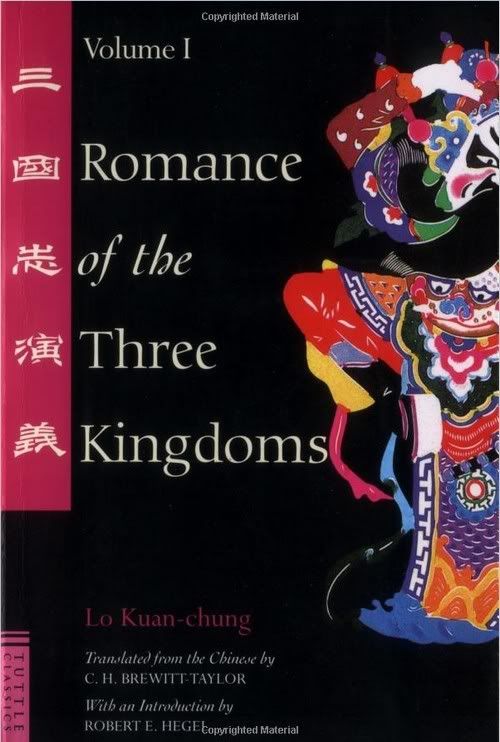
Since its publication in 1946, George Orwell's fable of a workers' revolution gone wrong has rivaled Hemingway's The Old Man and the Sea as the Shortest Serious Novel It's OK to Write a Book Report About. (The latter is three pages longer and less fun to read.) Fueled by Orwell's intense disillusionment with Soviet Communism, Animal Farm is a nearly perfect piece of writing, both an engaging story and an allegory that actually works. When the downtrodden beasts of Manor Farm oust their drunken human master and take over management of the land, all are awash in collectivist zeal. Everyone willingly works overtime, productivity soars, and for one brief, glorious season, every belly is full. The animals' Seven Commandment credo is painted in big white letters on the barn. All animals are equal. No animal shall drink alcohol, wear clothes, sleep in a bed, or kill a fellow four-footed creature. Those that go upon four legs or wings are friends and the two-legged are, by definition, the enemy. Too soon, however, the pigs, who have styled themselves leaders by virtue of their intelligence, succumb to the temptations of privilege and power. "We pigs are brainworkers. The whole management and organisation of the farm depend on us. Day and night, we are watching over your welfare. It is for your sake that we drink that milk and eat those apples." While this swinish brotherhood sells out the revolution, cynically editing the Seven Commandments to excuse their violence and greed, the common animals are once again left hungry and exhausted, no better off than in the days when humans ran the farm. Satire Animal Farm may be, but it's a stony reader who remains unmoved when the stalwart workhorse, Boxer, having given his all to his comrades, is sold to the glue factory to buy booze for the pigs. Orwell's view of Communism is bleak indeed, but given the history of the Russian people since 1917, his pessimism has an air of prophecy. --Joyce Thompson --This text refers to the Paperback edition.
Author: George Orwell
Genre: Political Fiction
Publisher: Houghton Mifflin Harcourt (November 20, 1990)
Media type: Hardcover, Paperback, Audio Book
Pages: 144 pages
ISBN-13: 978-0151072552
Publication date: 17 August 1945
Reader Review

"Four legs good, two legs bad!!!"
"Animal Farm" by George Orwell was never required reading for me when I was in school, so it took me some time to finally get around to reading it. I found it to be a complete and enjoyable read that had me hooked from the very first sentence. It is an excellent exercise in symbolism and creative imagination. While the book may be a very short read, it brings a whole lot to the table by giving you an interesting take on how history can be reenacted in the most imaginative ways.
The animals on Mr. Jones' farm have had enough of what they deem to be slavery. They're tired of being ordered around by humans while they see no benefits in their daily work. This is all sparked by a dream that the boar, Major, had about a unique place where animals called the shots and never had to be ordered around by humans ever again. He tells them a revolution is very much needed. When Major dies, the animals act quickly and are able to overthrow the alcoholic farmer and his thugs from his very own farm. The pigs are in charge now, as they claim that they are much smarter than the others and know how to lead. What seems to be paradise quickly transforms into another form of slavery altogether enforced by propaganda and threats from the pigs. And yet, the animals do not know any better, as they are deceived by the new system that gives them the illusion that they are better off than they were with Mr. Jones calling the shots.
The book is greatly inspired by real events that went down during the era of communism in Russia, using animals as the actual people. While it helps to know about that time period, the book is written so well that it is easily understood even if you only know a little about what happened during that time. The use of animals was a very creative way to tell this story, as it gives you a big incentive to actually care for these characters. Had this just been about real people, then it would've just sounded like anything you could find in your history books. Orwell finds a much more interesting way of tackling the topic. He gives life to every one of his characters and they all elicit some kind of a feeling from you. There are times when the book is funny, and then there are times when it is just downright chilling (the last chapter will stay in your head for more than a few hours).
George Orwell's "Animal Farm" is a genuine masterpiece that quickly hooks the reader from the very beginning. It's an extremely easy read as well as an enjoyable one--not enjoyable in the sense that this is a "happy tale," but enjoyable in the sense that you really feel like you're reading something great. If you haven't had the chance to check it out, make sure you add this to your reading list. It is something that should be read by everyone at least once in their life, even if they don't end up enjoying it as much as others. I loved every single word that was written in the extremely creative read. This is an important classic in literature that shouldn't be missed for any reason.
- by Michael Crane

The power of words
"Animal farm" is to this day one of the best attempts to criticize a totalitarian regime through the means that literature provides: the power of words. George Orwell (1903- 1950) wanted to help others to realize things that for him were evident, and attempted to do so by writing a fable that can easily be read as a satire of the Russian Revolution. Orwell said in an article that "Every line of serious work that I have written since 1936 has been written, directly or indirectly, against totalitarianism and for democratic Socialism, as I understand it. It seems to me nonsense, in a period like our own, to think that one can avoid writing of such subjects. It is simply a question of which side one takes and what approach one follows".
Orwell also pointed out that "Animal Farm was the first book in which I tried, with full consciousness of what I was doing, to fuse political purpose and artistic purpose into one whole". He succeded beyond his wildest expectations, even though at first nobody wanted to publish this work because it was too controversial.
The plot of this book is relatively easy to grasp, and I think that is probably one of the reasons why it is so popular. Some animals decide to take over the conduction of a farm, because they believe there is too much injustice, and that they would improve the situation if they had the power to do so. They make a revolution, and end up evicting Mr. Jones, the owner of the farm. From that moment onwards, the farm is called "Animal farm"...
The animals establish seven "commandments", that they are supposed to obey at all moments in the new "Animal farm": 1- Whatever goes upon two legs is an enemy, 2 - Whatever goes upon four legs, or has wings, is a friend, 3- No animal shall wear clothes, 4 - No animal shall sleep in a bed , 5 -No animal shall drink alcohol, 6 - No animal shall kill another animal , 7- All animals are created equal. At the same time, all commandments can be comprised in a maxim: "Four legs good, two legs bad".
Everything seems all right for sometime, and all the animals work together for the success of the revolution, obeying the commandments and striving for a new order of things. However, after a while the pigs begin to think that being part of the animal revolution is not enough: they want to dominate it. After that first realization things take a quick turn for the worse, and we cease to be in the presence of a "wannabe utopical society", having instead to be unwilling witnesses to the birth of a new totalitarian society.
At that moment, the pigs even change some of the commandments. For example, the fourth commandment turns into "No animal shall sleep in a bed with sheets", and the sixth commandment says "No animal shall kill another animal without cause". Now, the commandments can be reduced to "Four legs good, two legs better". Finally, all the commandments will be replaced with one: "All animals are created equal, but some animals are more equal than others".
All in all, I consider "Animal farm" extremely interesting, even though it is somewhat sad and pessimistic. The language is clear, and you won't find yourself wondering what the author meant by a phrase, or needing to read a paragraph again. From my point of view, that makes the reading process even more enjoyable.
Despite that, I believe that this book will be considerably more appreciated by those with some basic knowledge regarding the Russian Revolution. Only then will the reader be able to take full advantage of what this short fable can offer him, due to the fact that he will realize without too much effort that some of the fictional characters in "Animal Farm" were inspired by historical characters. For example, Napoleon (one of the pigs) was quite possibly inspired by Stalin, and Snowball (another pig) by Trosky. When you read this book, try to find the characters that represent the proletariat, the Communist Party, the intellectuals, etc... :)
On the whole, I regard this book as one of those you just need to read, but that fortunately you can also enjoy. The messages implicit in "Animal farm" are many, and the questions it makes you pose yourself are even more. But then, what better than a book that makes you THINK ?
- by M. B. Alcat
"Pig"-headed Beasts
Animal Farm, a book full of "pig"-headed beasts! When reading this book my emotions ranged from being sympathetic with the animals in the beginning to pitying the animals for their stupidity. I felt bad when Mr. Jones would work the animals hard and only feed them enough to get by. But my sympathy turned to pity when the animals fell for Napoleons propaganda (squealer's speeches). After finishing the book I realized how bad totalitarianism is and despised Napoleon for becoming such a power hungry "pig".
My favorite character was probably Clover. She was my favorite because she was pretty smart and didn't always agree with Napoleon right away. She questioned his and the other pigs' behavior. She was the only animal that would realize every time Napoleon changed a commandment. She was also very nurturing and mother like towards the other animals.
I really liked how everything in the book paralleled something in Russian history. It was really interesting to try and figure out what everything meant. I also really liked the book because it was an easy read and I had no trouble trying to figure out what happened.
George Orwell did a wonderful job showing how totalitarianism is bad and eventually will not work in favor of the people or animals in this case. I really enjoyed how he used a story about animals to explain the effects of totalitarianism. It turned something that otherwise could be a boring subject into a story about a farm.
I learned a lot about totalitarianism in this book. I knew that it was bad prior to reading the book but I had no idea how it affected the people the so badly. I always used to wonder why the people never fought against a dictator but after reading this book I realize that sometimes the people don't even now how bad they have it.
I thought that the end of the book was sort of disappointing. I wanted the ending to include a big downfall of Napoleon since he was such a horrible leader to the animals. But instead the book ended with Napoleon being happy and still in control.
There are a few things I still don't understand. I don't know what the windmill in the book represents in Russian history. I also didn't understand the ending. Why couldn't you tell the difference between the pigs and the humans? and What does that represent in history?
I would definitely recommend this book. It is a very interesting book to read in either an English class or a history class. I wouldn't recommend this book to someone to read outside of school because the book is much more interesting when you can compare it to the Russian history.
I don't know if I would read another book by this author. This particular book was interesting because it was so accurately representing an actual country's government. I might read another book by this author if there was another book that included this quality.
Overall Animal Farm is an "oink"-ing good time to read!
- by Alexa Sevin



![The Magician King by Lev Grossman [2011]](http://i958.photobucket.com/albums/ae70/vneditor/the-magician-king-by-lev-grossman.jpg)